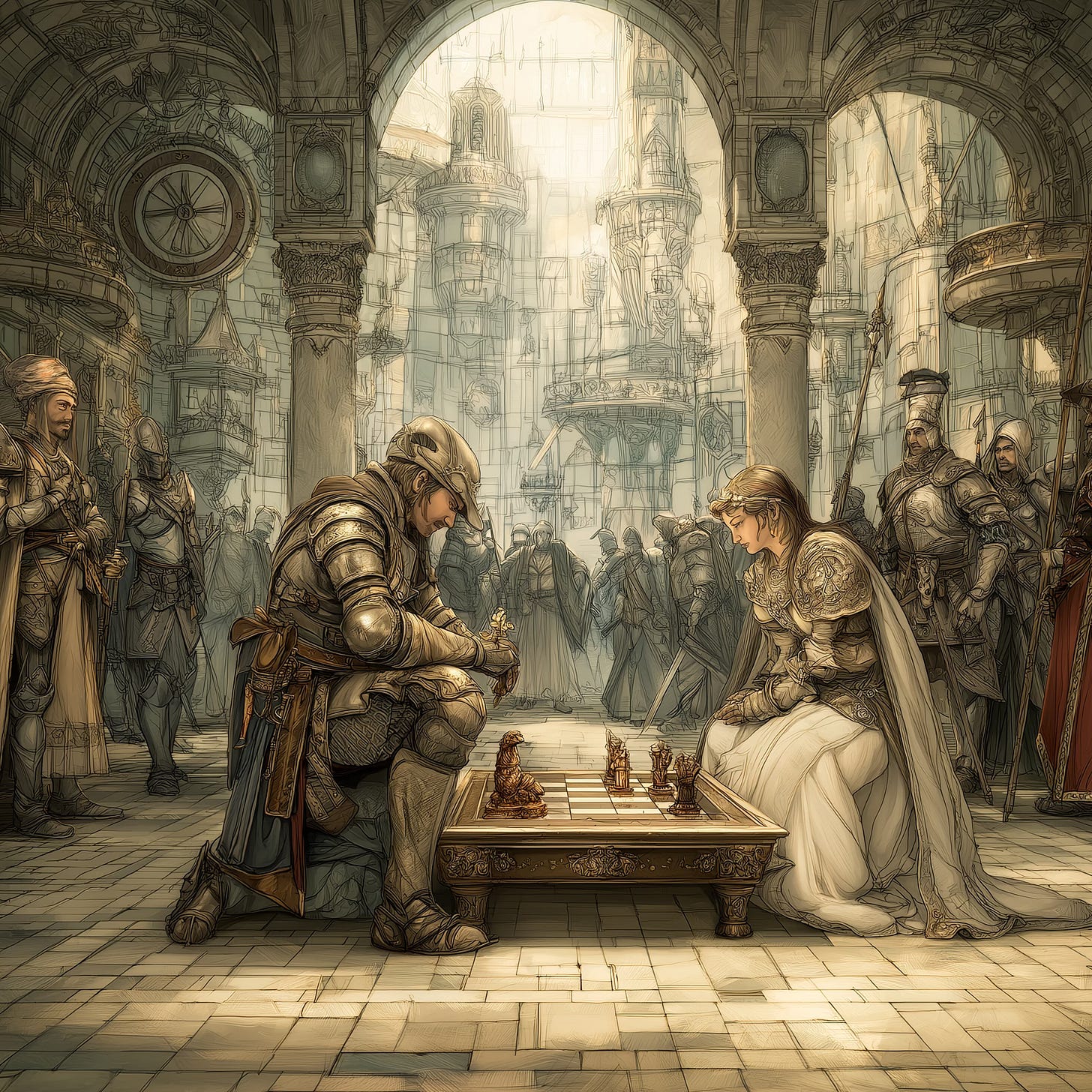No Kings in the Pit
Why Turnaround Leadership Feels Tyrannical in Times of Comfort
Joe Clark on Facebook quipped, “Should I be offended that I haven’t been asked to join in a protest? 🤷♂️ I’m still hoping tomorrow is similar to Y2K—the biggest non-event in history.” He was talking about the “No Kings” protest — a movement that, if you squint just right, manages to sound both revolutionary and oddly monarchical itself.
I replied, half in jest, half in confession: “As a self-identified conservative — whatever that even means anymore — I’m generally a rule follower. My wife hates me for it at times. But on this subject, I can’t help noticing how the left can’t meme. No Kings? Like, WTF?”
And then I added something that’s been bothering me for years: why does Trump’s endless stretching of norms, that daily bending of reality, not bother me the way it should? The answer, I think, lies less in ideology and more in psychology — and in how power, chaos, and leadership look different depending on which side of the fire you’ve been burned on.
The Moral Dissonance of Rule-Followers in a Broken Game
We conservatives — or at least the ones still trying to color inside the lines — often find ourselves in a strange moral tension. We were raised to believe that order itself was the moral high ground: laws matter, systems matter, processes matter. Civilization, we told ourselves, was built on restraint.
But restraint only works when everyone’s playing the same game. When the referees are blind, when the media tilts like a pinball table, when bureaucrats and algorithms quietly decide what’s “truth,” the moral calculus shifts.
You can only play by the rules so long as the rules themselves are real. Otherwise, you’re not being virtuous; you’re being a sucker.
This is why Trump’s excesses don’t rattle many of his supporters. It’s not because they mistake him for a saint — they don’t. It’s because he seems to be fighting asymmetry with asymmetry. A rule-bender, yes — but in a world where the rule book itself has become propaganda, maybe a little bending feels like justice.
It’s the ancient paradox of the republic: when corruption becomes systemic, does rebellion become moral? Shakespeare knew it. So did Cincinnatus. Every civilization eventually meets this test — and every voter has to decide which kind of dictator they’d rather hire.
The Pit Boss and the CEO
This brings me back to a man I once met: Peter Schutz, the turnaround CEO who saved Porsche in the 1980s.
When Schutz took over, Porsche was collapsing. The board had actually decided to kill off the 911 — the car that was Porsche. Engineers were demoralized, leadership was adrift, and the brand was circling the drain.
Schutz walked into a conference room one morning, saw a chart showing the 911’s planned demise, and picked up a marker. He drew a long line — stretching far into the future — and said simply, “The 911 will continue.”
It was a dictator’s move, but a benevolent one.
He didn’t take a vote. He didn’t form a committee. He just decided.
Under his command, Porsche rediscovered its identity and returned to profitability. Schutz wasn’t a tyrant; he was a man who understood timing. In his world, democracy was for the boardroom; dictatorship was for the pit lane.
Le Mans taught him that when the race is on, there’s no time to deliberate. The car is waiting. The clock is ticking. And someone has to grab the tire.
Trump’s leadership, when stripped of the theater — the rallies, the tweets, the verbal pyrotechnics — echoes this pit-crew logic. He doesn’t just act like a turnaround guy; he is one.
People mock his bankruptcies as proof of recklessness, but in reality, they forged the very instincts that define his management style. You don’t survive multiple financial collapses without learning to make brutal, time-sensitive calls — firing fast, restructuring debt, cutting losses, and moving before the market does. Every bankruptcy left scar tissue that taught him how to operate in chaos and live to fight another day.
That’s the mindset he brought to Washington: the triage of a man who’s stared at the edge of insolvency and decided to double down rather than fold. He runs his administration like a turnaround shop — loyalty above diplomacy, speed above consensus, action above optics.
To critics, it looks authoritarian.
To his supporters, it looks like the first adult in decades willing to yell, “Just fix the damn car.”
Democracy chooses its pit boss every four years. The danger isn’t in electing one; it’s in forgetting why you needed one in the first place.
The Age of Excess and the Illusion of Effortless Growth
Part of why this leadership style feels so alien is that most people have never seen real turnaround work.
The pre-COVID era — roughly 2009 through early 2020 — was what Lux Capital’s Josh Wolfe called an “excess of excess.” Cheap money. Easy credit. Unicorns multiplying like rabbits. Venture funds chasing “moonshots” with no gravity.
It was an age where risk felt extinct and effort optional.
Near-zero interest rates didn’t just inflate markets; they warped the public’s perception of reality. Entire generations mistook prosperity for permanence. Business failure became a meme, not a tragedy. Leadership was rebranded as “vibes management.”
So when someone like Trump barks orders, people hear tyranny.
When he imposes tariffs or bulldozes bureaucracy, they see madness.
But that’s because the populace, marinated in a decade of “up only,” had lost the muscle memory of adversity.
Peter Schutz’s turnaround playbook — hard calls, accountability, ruthless focus — was written for a world that understood scarcity. The post-2009 world did not.
In boom times, efficiency looks cruel. Hierarchy feels outdated. But prosperity hides fragility — and when the tide goes out, as Buffett said, you see who’s been swimming naked. COVID pulled the tide back, and suddenly the water was cold.
That’s why movements like “No Kings” sound noble but hollow. They mistake comfort for freedom. They forget that even democracies sometimes need a captain who shouts instead of asks.
As journalist Michael Tracey quipped, “99% of the ‘No Kings’ protesters would have their grievances fundamentally redressed simply by putting in a Democratic president. That’s what makes it so lame — it’s just standard partisan angst, dressed up with loftier-sounding language.”
The irony, of course, is that those shouting “no kings” often rely on invisible kingdoms — from central banks to big tech — that quietly rule their world every day. Their rebellion, like most modern ones, is franchised and algorithm-approved.
Seeds in the Smoke
We are, perhaps, a civilization in the pits. The tires are bald, the engine’s smoking, and half the crew has wandered off to argue philosophy on social media.
Every side claims to hate authoritarianism, yet every side cheers for it when their team is losing. We don’t want kings — but we do want saviors. We want the clarity of command without the discomfort of obedience.
Maybe what we need instead is competence.
Maybe the next great American renewal won’t come from ideology at all, but from people who remember how to grab the tire — to fix the thing that’s broken without asking for applause.
Peter Schutz saved Porsche not by reinventing it, but by reminding it who it was. Maybe the same could be said for the country.
Because the truth is, democracy isn’t a perpetual motion machine. It’s a race car — temperamental, beautiful, and prone to catching fire if left unattended.
And sometimes, to save it, you don’t need a king.
You just need someone who still knows how to drive.
✨ Seed Thought: Turnaround requires tension. Comfort kills precision. The pit boss is not the enemy of democracy — complacency is.








Insightful. Your point about the psychology behind how power and chaos are perceived, especially depending on which side of the fire you've been burned on, is really astute. It makes me think that the continuous stretching of norms, regardless of whos doing it, ultimately corrupts the underlying operating system of our societies, affecting everyone far beyond individual moral tensions.